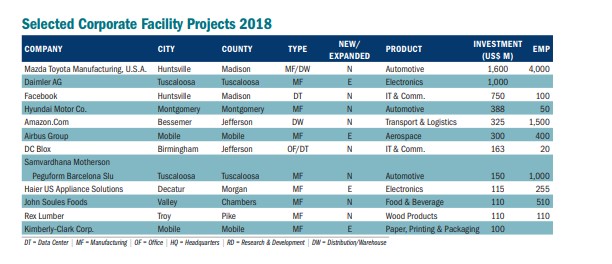Site Selection magazine released its annual State of the States report highlighting economic development activity for each of the 50 states. The report is one of the industry’s primary sources for site selectors and supplies information used to determine the nation’s most advantageous locations for new jobs and investment.
Leading the list of legislative activity in Alabama was the 2018 law passed exempting site selectors from registering as lobbyists with the Alabama Ethics Commission stating, “Supporters of the legislation argued that requiring site selectors to register with the government and disclose their confidential clients would chase away potential projects.”
What it fails to mention is that what passed last session was only temporary.
Last year, state legislators narrowly passed the Alabama Jobs Enhancement Act to define the role of economic developers who are tasked with growing the state’s economy. Election year hype and misinformation incited a backlash against the bill and the measure became a short-term band-aid set to expire on April 2, 2019.
Since the passage of the bill, Alabama’s headlines have continued to tell a winning story when it comes to new jobs and corporate investment. These projects chose Alabama in a fiercely competitive playing field:

Alabama’s new law enabled these announcements and many more. More importantly, the act finally provided definition to a very grey application of the ethics law by creating more transparency, accountability and clarity.
Transparency and Accountability
To be considered eligible for state incentives, every project interested in locating in Alabama must register with the Department of Commerce. Alabama offers a two-year term of confidentiality on project information. Project details are available for public disclosure after that term.
Prior to its passage, project details were never available for public disclosure. The term of disclosure also applies to local economic development organizations.
Greater Restrictions
The term “economic development professional” is defined by the law and expressly excludes public officials, public employees, legislators, and former legislators (within two years of the end of their term).
Legislators are not allowed to accept compensation to lobby on behalf of any person or entity seeking economic development incentives.
Defined Roles
The law provides clarification of where the activities of economic development professionals end and where that of a lobbyist begins.
-
- If you are not a registered lobbyist, it is unlawful to promote, oppose or otherwise influence a member of a legislative body for NEW incentives. It is only lawful to discuss statutory or constitutional economic development incentives that are already available to economic development projects with public officials.
- The law includes economic development professionals who choose to lobby under the restraints and requirements of the ethics law (required registration, quarterly disclosures and restricted giving to elected officials)
Alabama’s newly elected legislators will be tasked with addressing the issue once again and hopefully, along with the Alabama Ethic’s Commission, provide a lasting solution so that Alabama can keep winning these coveted projects while maintaining some of the strongest anti-corruption laws in the country.
Allison Ross is a former site selector and economic developer. She is the publisher and owner of Yellowhammer Multimedia.
Don’t miss out! Subscribe today to have Alabama’s leading headlines delivered to your inbox.
